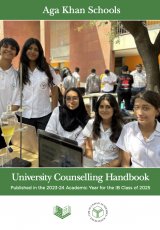Turning students into storytellers through investigative photography
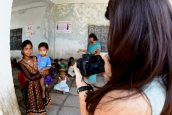 Students from the Aga Khan Academy Hyderabad participating in the advanced Fredric Roberts Photography Workshops have spent the last week unearthing powerful visual stories on women anganwadi workers in neighbourhood villages, and the repercussions of dramatic urbanization in Hyderabad and its surrounding areas. Using professional DSLR cameras, donated by Roberts, the dozen students from grades 10-12 were empowered to identify, critique, question and analyse
Students from the Aga Khan Academy Hyderabad participating in the advanced Fredric Roberts Photography Workshops have spent the last week unearthing powerful visual stories on women anganwadi workers in neighbourhood villages, and the repercussions of dramatic urbanization in Hyderabad and its surrounding areas. Using professional DSLR cameras, donated by Roberts, the dozen students from grades 10-12 were empowered to identify, critique, question and analyse 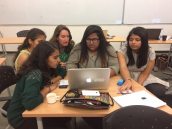 fundamental global issues in their immediate environment through the lens of photography.
fundamental global issues in their immediate environment through the lens of photography.
"This isn't just a photography workshop - it's a process of transforming young people's lives through the use of photography as a means of self-expression," explains Roberts, award-winning photographer and retired Wall Street executive. "We teach the skills of photography to tell stories through photographs, but it's much more than this. It gives young people knowledge and 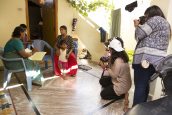 perspective, enhances their self-confidence, and gets them to engage with their environment in an intimate manner."
perspective, enhances their self-confidence, and gets them to engage with their environment in an intimate manner."
The first story documented a select number of women 'foot soldiers' as they went about their work at the Anganwadi Centres (AWCs) and on outreach visits at homes of community members. In a true expression of the inherent power of civil society, students captured poignant portraits of these incredibly 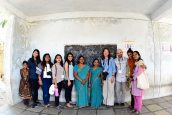 inspiring women while they taught young children the alphabet and numbers; served them food; weighed babies; fed pregnant mothers; and measured the height of infants.
inspiring women while they taught young children the alphabet and numbers; served them food; weighed babies; fed pregnant mothers; and measured the height of infants.
The AWCs were established as part of the national government's Integrated Child Development Scheme, a unique program that employs and trains community women to provide a package of services comprising supplementary nutrition, immunization, health check-ups and referral services, as well as pre-school non-formal education. The scheme was initiated to tackle malnutrition in young children and mothers, reduce infant and maternal mortality rates, educate mothers about nutrition and health, and improve feeding practices. There are 35,700 AWCs functioning in Telangana State and 67,411 anganwadi workers. Estimated numbers of beneficiaries are gauged at 2,228,150 (http://wdcw.tg.nic.in/).
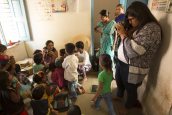 "The anganwadis were really new to me. I had never visited one and it was really fascinating to see the beautiful work the women are doing for the area they lived in," says Muskan Dharani, Academy grade 12 student. "It amazes me how much work is quietly being put into educating younger generations, taking care of mothers and how the smallest gestures have such a massive impact on the lives of these people in terms of their health and nutrition. The workshop served as a way to explore things that I had never seen before and taught me to look at ordinary things in a whole new light. It is important to realize that the pictures we take are not just for display on a wall to beautify it, but also to spread awareness and educate the world about the existence of such beautiful initiatives like the anganwadis."
"The anganwadis were really new to me. I had never visited one and it was really fascinating to see the beautiful work the women are doing for the area they lived in," says Muskan Dharani, Academy grade 12 student. "It amazes me how much work is quietly being put into educating younger generations, taking care of mothers and how the smallest gestures have such a massive impact on the lives of these people in terms of their health and nutrition. The workshop served as a way to explore things that I had never seen before and taught me to look at ordinary things in a whole new light. It is important to realize that the pictures we take are not just for display on a wall to beautify it, but also to spread awareness and educate the world about the existence of such beautiful initiatives like the anganwadis."
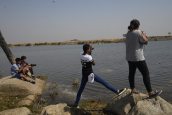 For the second story, students considered the rapid urbanisation that is taking place at a fast pace in India. The 2011 Census showed that 31% of the population lived in urban areas. It has been projected by the UN that, by 2030, 41% of the population will be urban dwellers. The same census showed Hyderabad as the 6th largest urban area in India in terms of population. It is expected to be the 4th largest in another decade, and is already quickly emerging as a national technology hub with major
For the second story, students considered the rapid urbanisation that is taking place at a fast pace in India. The 2011 Census showed that 31% of the population lived in urban areas. It has been projected by the UN that, by 2030, 41% of the population will be urban dwellers. The same census showed Hyderabad as the 6th largest urban area in India in terms of population. It is expected to be the 4th largest in another decade, and is already quickly emerging as a national technology hub with major 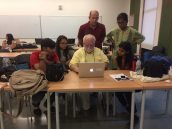 investments by Microsoft, Apple and Uber.
investments by Microsoft, Apple and Uber.
Students at the workshops were keen to document the changes and tell the story of urban encroachment in and around the city they live in. They have examined changes in agriculture, such as mechanization and changes in crops to meet the new demands of the rising middle classes. They also looked at the relentless construction of new infrastructure such as roads and housing to prepare for the burgeoning population. Pollution has come with urban encroachment as well as a changing city landscape, as global brands and contemporary architecture replace more traditional styles. There is also a migrant story as Hyderabad becomes a magnet for people from other Indian states who come seeking to improve their livelihoods.
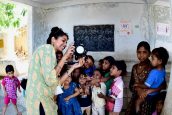 Roberts initiated his voluntary workshops for high school students in 2011 in Rajasthan, and has since conducted them in several countries across the world including Bhutan, Nicaragua, Tajikistan, Kyrgyzstan, Portugal, Canada, and the US. With assistance from a faculty of world-class photographers, each Beginners’ Workshop trains a group of 20 students, an equal number of girls and boys, and half from lower-income families.
Roberts initiated his voluntary workshops for high school students in 2011 in Rajasthan, and has since conducted them in several countries across the world including Bhutan, Nicaragua, Tajikistan, Kyrgyzstan, Portugal, Canada, and the US. With assistance from a faculty of world-class photographers, each Beginners’ Workshop trains a group of 20 students, an equal number of girls and boys, and half from lower-income families.
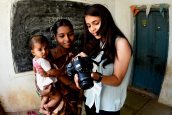 A long-term partnership between Fredric Roberts and the Aga Khan Development Network has led to Roberts and his team conducting numerous such workshops in various parts of the world, including the Aga Khan Academy Hyderabad which hosted the Workshops for the first time in October 2015. A second Beginners’ Workshop kicks off this weekend, which brings together 10 government school students with 10 Academy students, integrating diverse socio-economic perspectives, and in the process forging a strong sense of connection and respect among the students. Roberts’ workshop model ensures sustainability by also training local staff who continue to mentor the novice photographers once the workshop concludes. One of its unique aspects is continuing education, part of which involves returning to the workshop locations within two years to train previous graduates in advanced photography, as well as conduct the regular one-week beginner's workshop with a group of new students.
A long-term partnership between Fredric Roberts and the Aga Khan Development Network has led to Roberts and his team conducting numerous such workshops in various parts of the world, including the Aga Khan Academy Hyderabad which hosted the Workshops for the first time in October 2015. A second Beginners’ Workshop kicks off this weekend, which brings together 10 government school students with 10 Academy students, integrating diverse socio-economic perspectives, and in the process forging a strong sense of connection and respect among the students. Roberts’ workshop model ensures sustainability by also training local staff who continue to mentor the novice photographers once the workshop concludes. One of its unique aspects is continuing education, part of which involves returning to the workshop locations within two years to train previous graduates in advanced photography, as well as conduct the regular one-week beginner's workshop with a group of new students.
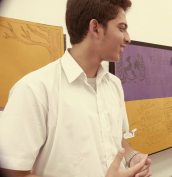 "Fred's beginner's workshop that took place in October 2015 really opened my eyes to the world of photography and made me passionate about the medium," says Nabil Patel, grade 10 student at the Academy. "I have since published my own 50-page instructive guide that teaches beginners who didn't have the same opportunity to learn from Fred the essentials of photography. This time, at the advanced workshop, I was challenged in a totally new way. I was part of a small team who attempted to portray urbanization and its impact on society through a photo essay. Even though we are aware of what's happening in Hyderabad, this was the first time I directly addressed the subject. I will be continuing to explore different aspects of urbanization in the coming year. Fred's workshop is great because it gives you the chance to grow, so I get the opportunity this year to be a teaching assistant for the beginner's workshop as well."
"Fred's beginner's workshop that took place in October 2015 really opened my eyes to the world of photography and made me passionate about the medium," says Nabil Patel, grade 10 student at the Academy. "I have since published my own 50-page instructive guide that teaches beginners who didn't have the same opportunity to learn from Fred the essentials of photography. This time, at the advanced workshop, I was challenged in a totally new way. I was part of a small team who attempted to portray urbanization and its impact on society through a photo essay. Even though we are aware of what's happening in Hyderabad, this was the first time I directly addressed the subject. I will be continuing to explore different aspects of urbanization in the coming year. Fred's workshop is great because it gives you the chance to grow, so I get the opportunity this year to be a teaching assistant for the beginner's workshop as well."
The body of student work will contribute to a curated exhibition at the Academy during the Fredric Roberts Workshops Graduation Ceremony on Saturday 1st April 2017, and will possibly be exhibited at other locations in the coming few months.
“These high school students are at a transformational point in their lives,” said Roberts. “We are giving them a new language and a new force with which to improve their lives and their communities. Hopefully, with the confidence they gain through our program, they will change the world.”
Photos by Esha Chiocchio and Mike Sakas



